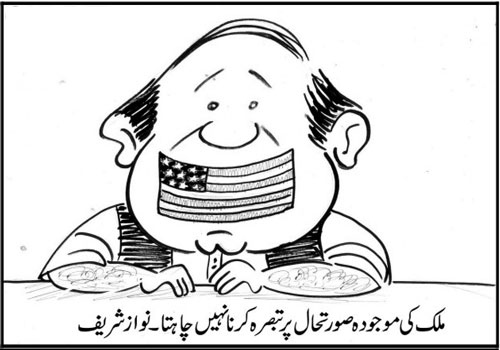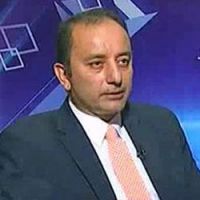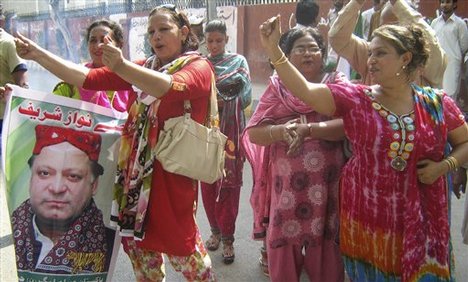 In 2000, Gen,(R) Musharraf’s dictatorship received $668 Million Loan from IMF, according Ahmed Rashid. There been no accountability of how the money was spent from this loan. The money seems to have disappeared into thin air. Pakistani people are left holding the bag. IMF tranche was taken out ostensibly to prevent Musharraf’s military regime from having to defaulting on its foreign debt. The government of Nawaz Sharif refused to implement IMF conditions. Even though, the Musharraf military regime had carried out some reforms including devaluation of the rupee, raising prices of petrol, gas and electricity and trying to broaden the tax base.
In 2000, Gen,(R) Musharraf’s dictatorship received $668 Million Loan from IMF, according Ahmed Rashid. There been no accountability of how the money was spent from this loan. The money seems to have disappeared into thin air. Pakistani people are left holding the bag. IMF tranche was taken out ostensibly to prevent Musharraf’s military regime from having to defaulting on its foreign debt. The government of Nawaz Sharif refused to implement IMF conditions. Even though, the Musharraf military regime had carried out some reforms including devaluation of the rupee, raising prices of petrol, gas and electricity and trying to broaden the tax base.
At present just over 1.6 per cent of the population pay income tax and the country is in a dire debt trap while its economy remains in acute recession.
Thousands of wealthy Pakistanis moved their assets since Musharraf’s military coup, and local and foreign investment came to a standstill.
During Musharraf’s time, an Islamabad based Western diplomat is quoted as saying: “The key to success is whether Gen Musharraf will use the breathing space given by the IMF to carry out meaningful economic and social reforms, which so far he has balked at doing.”
The IMF at that time was demanding a one third increase in poverty alleviation, money that will have to come from cuts in defence or military budget and in the bureaucracy.
The Actors Behind the Curtain: India and Jewish Lobby
Indian and Jewish members members of the World Bank hierarchy are using stealth tactics to cut Pakistan’s defence spending, by imposing draconian and usurious conditions on
Indian Director: Anoop Singh has been Director of the Asia and Pacific Department of the International Monetary Fund since November 2008. Before that, Mr. Singh was Director of the Western Hemisphere Department.
Mr. Singh, an Indian national, holds graduate and post graduate degrees from the universities of Bombay, Cambridge, and the London School of Economics. His other appointments at the IMF have included: Director, Special Operations in the Office of the Managing Director; Senior Advisor, Policy Development and Review Department; Assistant Director, European Department; and IMF Resident Representative in Sri Lanka.His additional work experience includes: Special Advisor to the Governor of the Reserve Bank of India (I.G. Patel and Manmohan Singh); Senior Economic Advisor to the Vice President, Asia Region, the World Bank; Adjunct Professor at Georgetown University; and sometime lecturer in Bombay University.
Jewish Director,Mr. David Lipton assumed the position of First Deputy Managing Director of the International Monetary Fund on September 1, 2011. He served as a Special Advisor to the Managing Director of the International Monetary Fund starting July 26, 2011 before assuming his duties as First Deputy Managing Director.
If Nawaz Sharif turns to IMF, Anoop Singh and David Lipton will focus on cutting Pakistan’s Defence Spending, Nuclear, and Ballistic Missile Programs. Jews and Indians never forget their primary goal is not to serve the interests of the institution like IMF, they represent. Their primary goal is to serve their own hidden agenda to their nations and religious affiliations.
Pakistan for any loans to bail out the current Nawaz Sharif government.
China: The only Hope
The West will also be demanding that the government should repress Islamist fundamentalists and terrorism, improve Pakistan’s appalling human rights record, moderate its policy towards India and cease military support for the Taliban in Afghanistan( a figment of Western imagination and Indian propaganda).
Nawaz Sharif is willing to accept all Western surrogate lender IMF’s conditionalities. While, a dictator Gen.(R)Musharraf resisted IMF conditionalities,
Nawaz Sharif is eager and willing to oblige, while Pakistani people get the short end of the stick.
To Nawaz Sharif, power is an opiate, which increases his wealth and Pakistan is his money machine or ATM.













